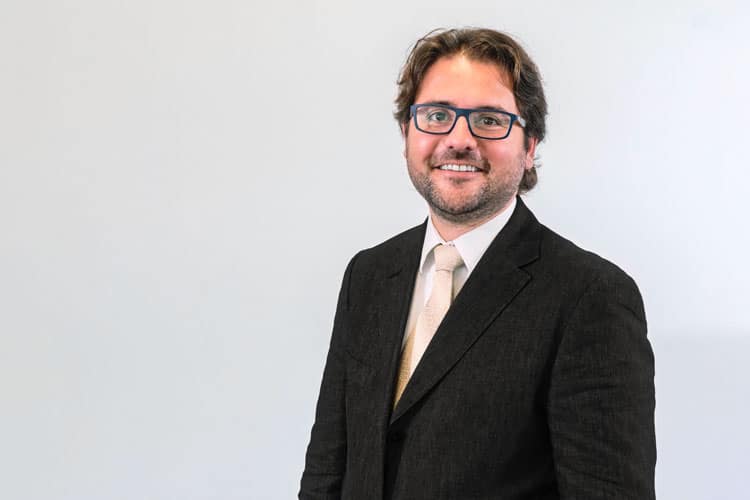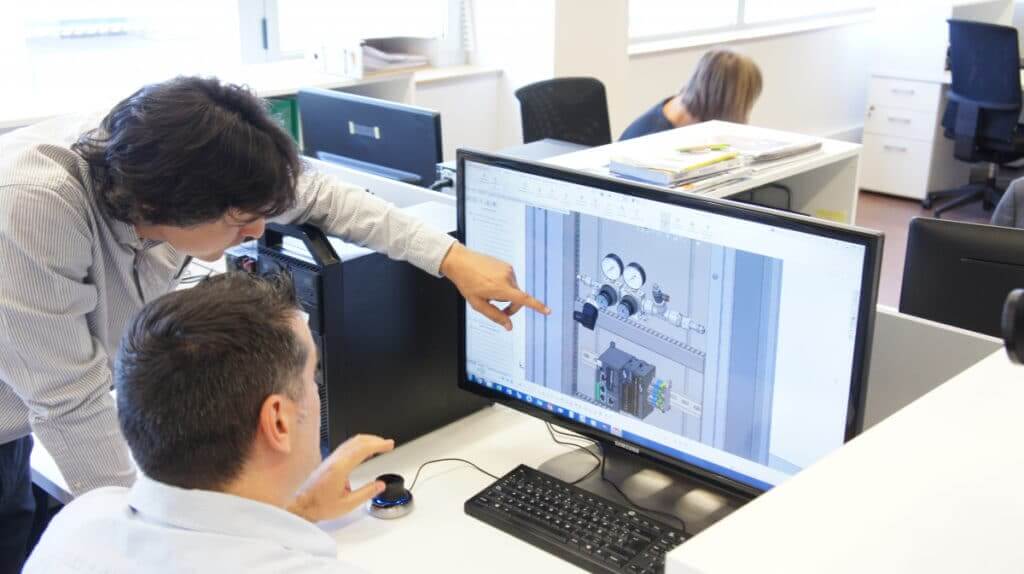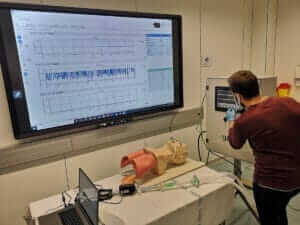Interview with Oriol Martínez Huguet, CEO of GasN2
What led to the founding of GasN2? What are your objectives and what services do you offer?
GasN2 was founded in 2009. At the time, I was working as a Product Manager for the industrial equipment line of a well-known company in the world of chromatography. I discovered that the machines that were coming in could really be improved in terms of performance, efficiency, design, and so on, and I suggested that the company build their own prototype. In a few weeks we built a functional model that was quite comparable to the ones we imported, but the company did not commit to continuing the project.
At this point, the seed of entrepreneurship had already been sown: I couldn’t stick with what we’d been offering as I didn’t feel comfortable offering a solution to the market that, in my opinion, was clearly flawed. And that’s how I founded GasN2 a short time later: first, from my garage at home, using products from other companies to be able to move forward, then we quickly advanced to exclusively offering our own solutions and technologies.
Our company’s objectives have been clear from the start: to be a benchmark in the industrial gases market that provides innovative, energy-efficient solutions, brings added value to our clients’ businesses, and represents clear economic savings for the industrial process. We do this while maintaining a solid commitment to doing the job right, working with respect for the environment, and special dedication to designing and developing new solutions every day.
What sectors do you aim your technologies and services towards? Do you offer customized solutions?
We offer our own technology for packaging in a protective atmosphere, cold and deep-freezing tunnels, carbon dioxide recovery equipment, dryers, and more. The world of food is where we have the greatest presence and a wide range of applications, but all these technologies can be applied in many other production processes in various sectors.
Currently, we have three consolidated production lines: the chromatographic gas generator/separator line, the deep-freezing equipment line, and the dryer line. In the case of the first, the chromatographic generators, we serve everything from industries that use nitrogen for laser cutting to 93% oxygen medical equipment. In this area, we offer on-site solutions to obtain gases with a purity that adapts to the requirements of a given process in an efficient and economical manner.
Deep-freezing equipment represents a paradigm shift in the world of industrial refrigeration through new technology that allows temperatures to reach -80 ºC.
Los equipos de ultracongelacion suponen un cambio de paradigma en el mundo del frio industrial, mediante una tecnología nueva que permite llegar a temperaturas de -80ºC.
Lastly, the dryer line is the newest area, opening the door for us to the dried and cured food sector. In this case, we have also turned the way things are done upside down, selecting systems that are very different from the traditional ones and offering energy savings of over 50%.
We always adapt our products to customer needs. This is one of the advantages of having your own technology: you have the know-how. Our equipment is customizable as the model or configuration that best suits the production process where it is to be implemented is always chosen. In addition, considering that installations entail a certain size, planning and adjustment work is required based on the client’s facilities. Finally, we always end up offering hybrid options between our different production lines, adapting to what clients need to improve their production process.
Do you go beyond the concepts of sustainability and environmental protection?
These concepts are essential for us. Like I said before, it involves more than just innovating. New things aren’t good just because they exist, but because they add something more. In our case, improving established processes is fundamental and, at this point, we have to see what happens globally. In most cases, we’re talking about energy efficiency, costs, how the process is carried out, and using what energy. And, above all, where does the energy come from?
In our R&D&i department, which represents 20% of our workforce, one of the most important design tasks lies in making the processes more efficient in all possible aspects. We ensure that the process actually consumes less energy, but we also address matters such as assessing which components are most suitable for making a piece of equipment. Where do I have to import them from? Are they parts or items that produce good results over time? How will they be maintained? Do we have solutions more within our reach that offer us the same benefits?
It’s not just about seeing an image of a machine once it has been installed, but everything that happens from the conceptual design to its final implementation in the company and its obsolescence. This is what really brings added and customized value to everything we do at GasN2. This is reflected in savings for clients and in improved production processes.
You’re an IQS graduate in Chemical Engineering. What do you remember from your time at the school? Any aspects that stand out?
I remember it very fondly. Your university days are unique in many ways. In short, it is the period of life in which you really become the man (or woman) that you will be for the rest of your life. It’s a time for education, but also for exploration. My time at IQS was a wonderful experience.
For me, one of the most remarkable aspects was being able to do laboratory work practically right from the first day of my studies. I think that, for all alumni who have studied here, this fact gives us a certain prior reputation, of which we aren’t usually aware, but which makes a difference compared to graduates from other universities when you enter the workforce.
GasN2 has a strong relationship with IQS. What was the experience like collaborating with the Industrial Doctorate that you carried out together?
For us it was an almost inevitable process. Having studied at IQS, and having design and development as the foundations of our company’s future, it was natural that a collaboration of this type should take place. The Industrial Doctorate led to the development of a prototype for separating CO2 from combustion gases, which is currently being implemented in various companies and which will become a new consolidated production line for GasN2.
But it didn’t all end there. At GasN2, we always have room for developing new technologies and improving existing ones. For this reason, getting stronger through a relationship like the one we have with IQS is essential. Currently, we have 16 active R&D projects, with a total of eight dedicated people, four of whom are interns.
In fact, we think that the relationship between industry and university should be much closer in general than it is in practice (not just us with IQS!). Universities must be able to work with the development needs of industries, thus we can feed on their knowledge of the state-of-the-art. At the same time, companies must understand that universities have needs, a vision, and a longer-term way of working on projects. It is certainly a complex but necessary balance in this business-university symbiosis that, in the end, echoes positively throughout society.
You recently joined the IQS Business Foundation. What does this represent for you? What do you expect from this new partnership?
IQS was founded to prepare university students with solid knowledge that would enable them to create and lead top companies in the chemical industry in the Catalan society of the future. These same university students, when they reach leadership positions in companies, need support from institutions such as the IQS Business Foundation to achieve visibility for such leadership. It is still the same symbiotic relationship that we talked about earlier between business and university: necessary and enriching for both parties.
For me, being part of the IQS Business Foundation represents both pride as an alumnus and a need to strengthen our company as a technology benchmark in the world of chemistry.
GasN2 played a prominent role during the toughest part of the coronavirus pandemic. As a society, do you think we have learned anything from everything that we are experiencing?
This is definitely a difficult question to answer! The truth is that I would like to think the answer is yes
For us, the pandemic has meant working more than ever. During the first wave, the hardest, we continued to offer our usual services, many of them focused on the food sector. Not only did the sector not slow down, but it also had to address the needs of a population in lockdown, which meant all meals were prepared at homes and food packaged in a cleaner, more protective, and more sterile atmosphere than food served over the counter was highly valued.
But it didn’t end there. In addition to continuing with day-to-day activities, we developed and certified an autonomous medical breathing device, the DAR, to offer hospitals an alternative manufactured in Spain at a time of great material shortages. This was a very intense race in which our workers were completely dedicated and collaboration with medical entities such as the Hospital Mutua de Terrassa, the Hospital de Vic, and the Hospital Clínic de Barcelona was total. As a result of this initiative to alleviate the consequences of the pandemic, GasN2 has received various recognitions and honours, including the Industry 4.0 2020 award and the 4th National SME Award for 2020 for the best initiative in the fight against Covid-19. From then on, GasN2 has continued to work on advances for the medical sector. Since 2021, we have had our own equipment certified by the AEMPS to supply 93% oxygen to hospitals, a milestone achieved in record time.
Overall, we could say that these last few years have been a push towards the future of GasN2. It has been an internal revolution. For society as a whole, I am not as sure, but it’s clear that it has been a significant shock. The pandemic and everything it has brought about in terms of restrictions, challenges, and difficult situations that we would never have imagined have made us look into the mirror. It has shown us the best and the worst of the faces of our society. If we have learned anything from it is a question only time will tell.




